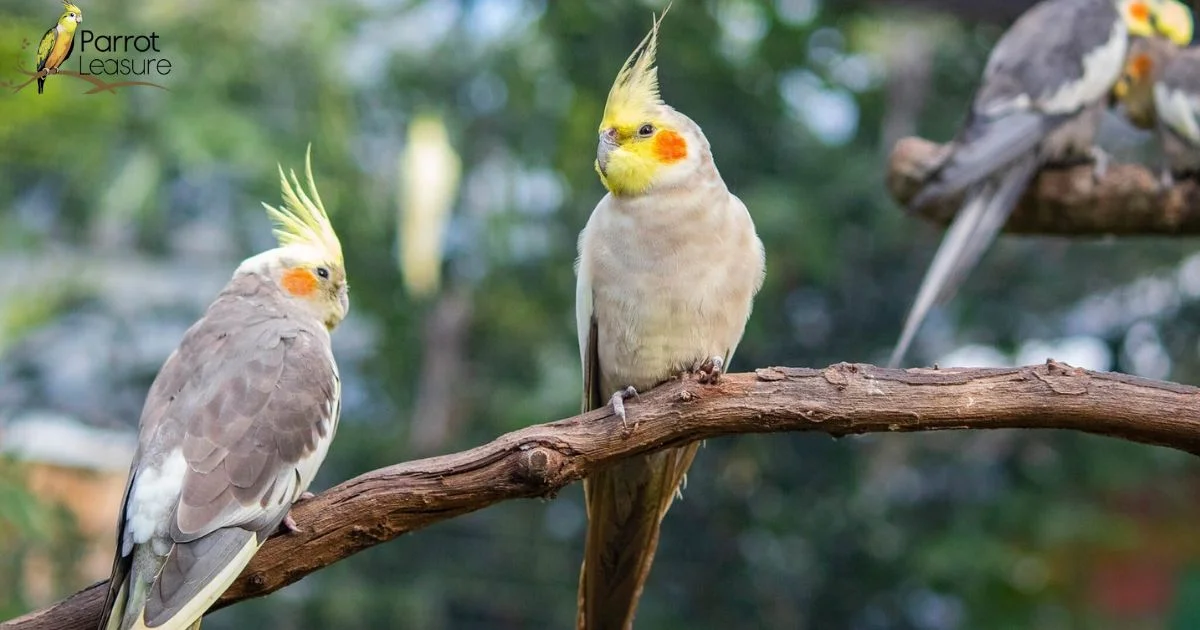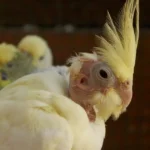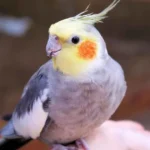Cockatiels are slender, crested parrots from Australia, often kept as affectionate pets. They’re known for their sociable nature and require attentive care to stay content. Recognizing their needs is crucial for their well-being.
Don’t let this question How to Calm a Stressed Cockatiel unsettle you. If your cockatiel is showing signs of distress, it’s time to act. Discover the expert advice that can turn your worried chirps into songs of serenity.
Stress in cockatiels can manifest in various ways, such as feather plucking or a change in vocalization. These signs indicate a need for a more nourishing environment or a closer look at their daily care routine. Let’s explore how to bring tranquility back to your pet’s life.
Understanding Cockatiel Behavior: The Foundation of Calm
Cockatiels show they are happy by singing and doing playful things like flapping their wings and nodding their heads. Recognizing these behaviors is key to ensuring your pet feels safe and understood.Hormones can make your bird’s mood change often, so it’s important to know what it needs to keep a calm setting.
By observing and responding to these cues, you can foster a harmonious relationship with your feathered friend. Aggression in cockatiels is often a sign of distress or fear. It’s essential to approach them calmly and avoid sudden movements that can startle them.
Providing a stable routine and environment can help minimize stress-induced behaviors. Playing gently and talking with your cockatiel helps it feel safe and trusted, which makes for a peaceful and cheerful pet.
Identifying Stress in Your Cockatiel: Key Signs and Symptoms
Stress in cockatiels can manifest through physical and behavioral changes. Key physical signs include feather loss, weight reduction, and the appearance of stress bars on feathers. If a cockatiel is stressed, it might not want to eat, act aggressively, or change its normal sounds.
It’s crucial to observe these changes closely as they can impact your bird’s health. To identify stress, watch for repetitive behaviors like excessive preening or feather picking Stress bars, small lines across the feathers are also indicative of chronic stress.
Changes in behavior, such as increased aggression or restlessness, can signal distress. Recognizing these signs early is vital for the well-being of your cockatiel.
| Sign/Symptom | Physical Indicators | Behavioral Indicators |
| Feather Loss | Visible bald patches, stress bars on feathers | Excessive preening, feather picking |
| Weight Change | Noticeable weight loss, less muscle mass | Loss of appetite, reluctance to eat |
| Stress Bars | Small lines across the feathers | – |
| Vocalization | Changes in pitch or frequency | Increased aggression, screaming |
| Repetitive Behavior | – | Pacing, restlessness, repetitive movements |
Creating a Soothing Environment for Your Cockatiel
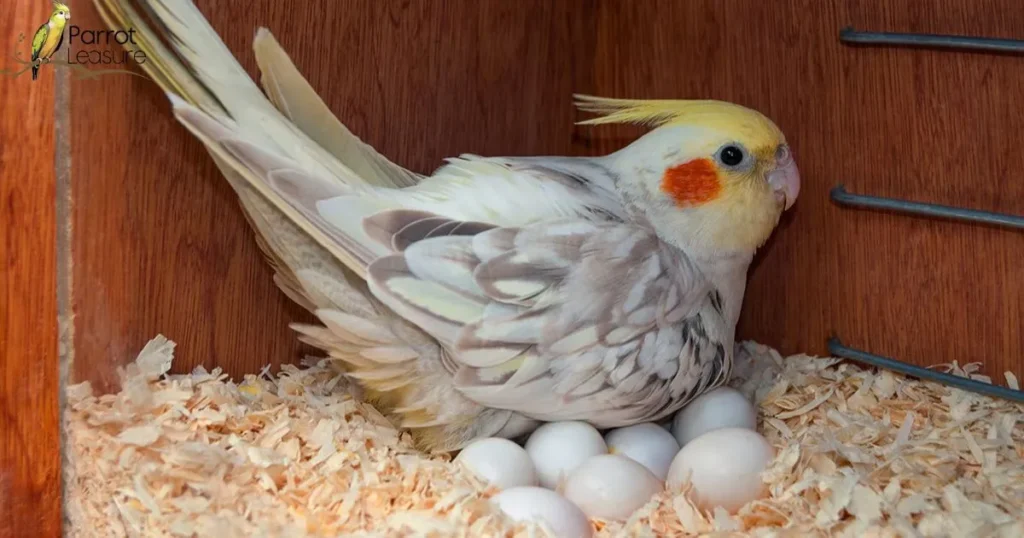
To create a soothing environment for your cockatiel, start with a quiet location in your home. Ensure the cage is spacious and secure, with room for flying and stretching. Include comfortable perches and a variety of toys for mental stimulation. Maintain a consistent routine with regular feeding and playtimes to provide stability.
Soft lighting and gentle background music can help calm your cockatiel. Keep their habitat clean and hazard-free, changing water and food daily. Offer healthy treats and interactive activities to build trust and prevent boredom. By paying attention to these details, you’ll create a peaceful haven for your feathered companion.
Nutritional Balance: Feeding Your Cockatiel for Emotional Health
A balanced diet is key to a cockatiel’s emotional well-being Pellets should form 40% of their diet, providing essential nutrients. Incorporate vegetables and fruits for variety and enrichment, making up 20% and 5% respectively. Treats can be offered sparingly, accounting for 5% of the dietary intake, to encourage bonding and positive behavior.
Consistency in feeding times aids in emotional stability. Serve meals twice daily to mimic natural feeding patterns, including treats like peanut butter for cockatiels in moderation. Cleanliness is crucial, always providing freshwater and clean food bowls. By adhering to these guidelines, your cockatiel will thrive, enjoying a diet that supports both physical health and emotional balance.
The Importance of Socializing Your Cockatiel
Socializing your cockatiel is crucial for its mental and emotional health. In the wild, cockatiels are part of a flock, engaging in daily social interactions. A well-socialized bird is more confident, friendly, and less prone to behavioral issues. Regular playtime and interaction with humans or other birds can prevent loneliness and stress.
Introduce your cockatiel to new people and environments gradually. This helps them become well-adjusted and reduces fear and aggression. Positive reinforcement through treats and praise encourages trust and bonding. Ensuring your cockatiel has social contact every day will promote a happier, healthier life.
Training Your Cockatiel: Techniques for Stress Reduction
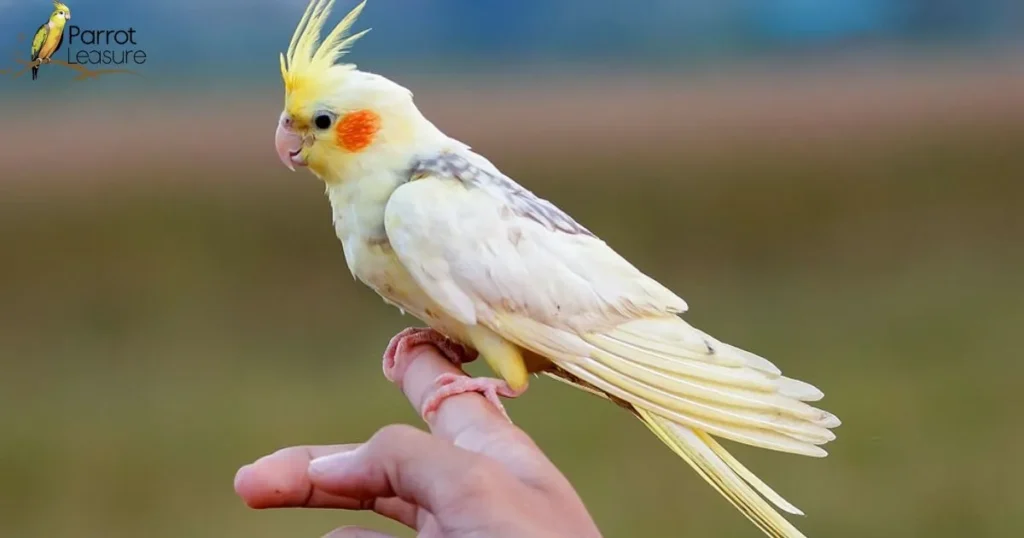
Training your cockatiel can be a soothing experience for both you and your pet. Start with simple commands and use treats as positive reinforcement. Consistent training sessions help build trust and reduce stress, making your cockatiel feel secure. Always end training on a positive note to ensure your bird remains eager to learn.
Incorporate play and exercise into training for mental stimulation. Puzzle toys and foraging activities are excellent for keeping your cockatiel engaged. Keep the training environment calm and avoid loud noises to prevent startling your bird. With patience and gentle guidance, your cockatiel will learn to associate training with fun and relaxation.
Addressing Physical Causes of Your Cockatiel’s Stress
Regular health checks are vital for identifying stress in cockatiels. Look for signs like feather loss, weight reduction, or stress bars on feathers, which can indicate distress. A balanced diet is essential, malnutrition can lead to physical stress, so ensure your cockatiel’s diet is varied and nutritious.
Also, check for any signs of illness or discomfort that could be causing stress, and consult a vet if necessary. Environmental factors play a role in your cockatiel’s stress levels. Sudden changes in their habitat or routine can cause anxiety. Ensure their living space is safe, comfortable, and free from loud noises or disruptions.
Regular interaction and gentle handling can help alleviate stress, making your cockatiel feel secure and loved. By addressing these physical causes, you can help maintain your cockatiel’s emotional health.
Gentle Handling: Comforting Your Stressed Cockatiel
Gentle handling is essential for comforting a stressed cockatiel. Approach your bird calmly and speak softly to avoid startling it. Offer your hand as a perch and allow the cockatiel to come to you on its own terms. Touch your cockatiel gently, stroking its feathers or offering a gentle scratch on the head.
Creating a bond through handling reduces stress and anxiety. Spend time daily with your cockatiel to build trust and familiarity. Use treats to reward calm behavior and reinforce positive associations with handling. Ensure the environment is quiet and free from sudden movements to keep your cockatiel at ease.
Mental Enrichment: Activities to Engage Your Cockatiel
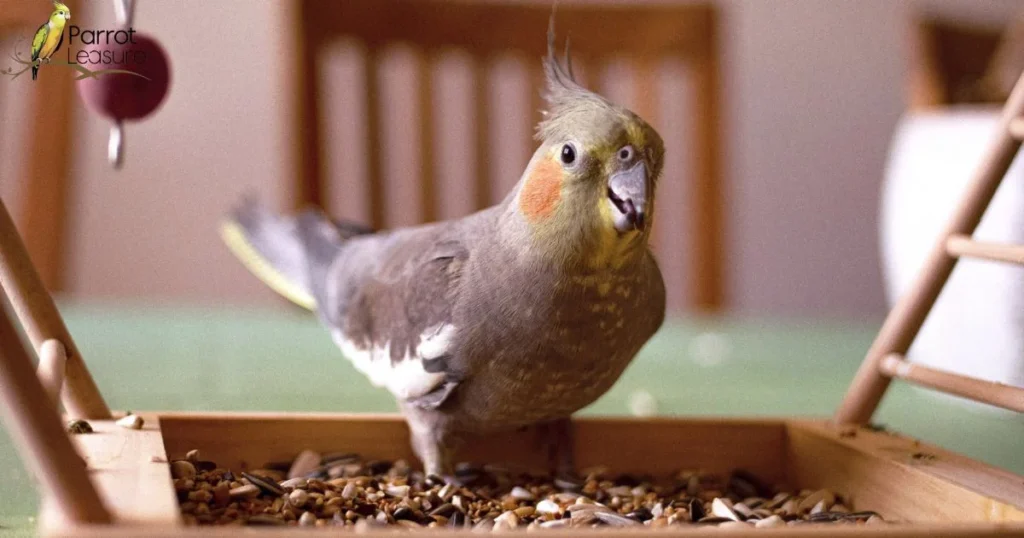
Engage your cockatiel’s curiosity with puzzle toys and swinging perches. These activities not only entertain but also provide essential mental stimulation. Incorporate training sessions and games like fetch to strengthen your bond and challenge your bird’s intellect.
Rotate your cockatiel’s toys regularly to keep their environment fresh and interesting. Offer toys that encourage shredding, chewing, and foraging to mimic natural behaviors. This variety will help prevent boredom and promote a happy, healthy bird.
Establishing Routine: The Key to Your Cockatiel’s Stability
A consistent daily routine is crucial for your cockatiel’s well-being. Set regular times for feeding, play, and rest to create a sense of security. Training sessions should also follow a schedule, reinforcing good behavior and enhancing your bond.
Ensure a stable environment by maintaining a quiet space and minimizing disruptions. A predictable routine helps your cockatiel adjust to their home and supports their mental health. Patience and observation are key to adapting the routine to your bird’s unique needs.
Seeking Expert Help: When Your Cockatiel Needs More Than Home Care
When your cockatiel shows unusual behavior or persistent health issues, it’s time to seek expert help. Regular vet visits, at least annually, are recommended for a thorough health check-up. For immediate concerns, especially if your bird’s condition worsens, contact your veterinarian without delay.
Expert advice is essential for specific issues like overgrown nails and beaks, or behavioral problems such as feather plucking. A vet can provide tailored care and treatment plans, ensuring your cockatiel’s health and happiness.
FAQ’s
How do you relieve stress in cockatiels?
Natural branches and safe chewing toys can offer mental stimulation and prevent boredom. Another essential aspect of stress management for pet birds is a balanced and nutritious diet.
How do you cheer up a cockatiel?
Playing an instrument, whistling, or singing can be entertaining for you bird. With enough exposure to certain songs, it may even learn to sing them back to you. Play hide and seek with your bird.
What stresses a cockatiel?
During times of change (e.g. moving home, change of routine), birds can become confused and stressed. Even simply moving their cage to the other side of a room can cause stress.
How do I make my bird fall asleep?
If your bird’s cage is in a highly trafficked area of the house, you might want to transfer your bird to a designated sleep cage and place the cage in a quiet and undisturbed room for the night.
Final Thoughts
Caring for a stressed cockatiel requires patience and gentle attention. Start by creating a peaceful environment and observe your bird’s behavior closely. Offer toys and activities that promote calmness and avoid sudden movements or loud noises.
Building trust with your cockatiel is key to its well-being. Spend time each day interacting with your bird in a calm manner. With consistent care and a nurturing approach, your cockatiel will gradually become more relaxed and comfortable in its surroundings.
